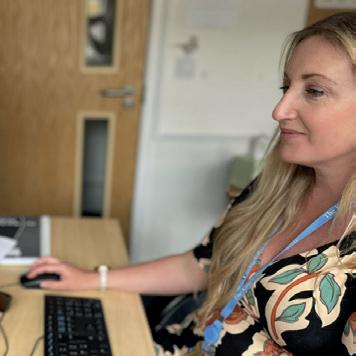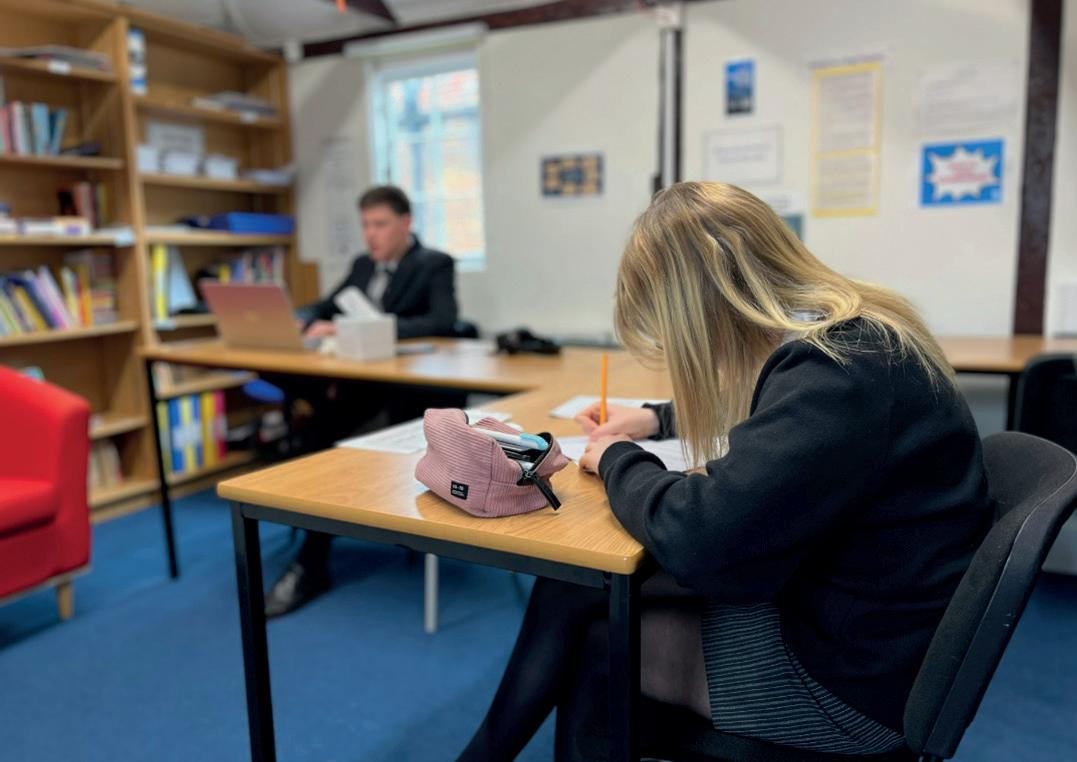Learning Enhancement (The Hub)






 Camilla Titterton, SENDCo, Specialist Teacher & Assessor
Suzanne Burke, Specialist Teacher & Assessor
Claire Parkin, Specialist Teacher & Assessor
Kate Rothwell, Specialist Teacher & Assessor
Melissa Jones, Specialist Teacher
Bonnie Rafferty, Specialist Teacher & Assessor, EAL Coordinator
Camilla Titterton, SENDCo, Specialist Teacher & Assessor
Suzanne Burke, Specialist Teacher & Assessor
Claire Parkin, Specialist Teacher & Assessor
Kate Rothwell, Specialist Teacher & Assessor
Melissa Jones, Specialist Teacher
Bonnie Rafferty, Specialist Teacher & Assessor, EAL Coordinator
Welcome to the Hub
The Hub is an inclusive and supportive place where students who need a little extra academic support can access it. We have high expectations for our students and our aim is that all our students will reach their potential.
We have our own designated building in the school, which comprises five small teaching rooms, a study area, a small classroom, and an office. We currently have six part-time teachers who work in the department with a wealth of experience and expertise between us. The Hub is also home to English as an additional Language (EAL).
Support and how it works
The Hub is not a place that gives continuous extra teaching to students and does not provide subject tutoring, as it is expected that Quality First Teaching and subject clinics from subject staff will meet the classroom needs of most students. Although the majority of students who access support from The Hub do have an identified learning difficulty, we are open to any student in the school. This support is sometimes 1:1 and is sometimes provided in a small group, and is tailored as much as possible to each student’s individual needs. Support may be proactive or reactive or a combination of both. For some students, support may be to help students with their organisation, prioritising tasks, or helping them start off a difficult prep, whilst for others it might be learning good study and revision methods, looking at exam technique, focusing on essay skills or consolidating difficult topics. We also use Lexia, a computer intervention for literacy to boost reading.
Support is usually given 1:1 or in a small group in a 35 minute session, usually once a week or sometimes once a fortnight. Support may be offered on a short or longer-term basis, depending on a student’s needs and progress at school. Sometimes a student just needs a few support sessions to help them get back on track, as our aim is for students to become independent learners who are equipped with a toolkit of strategies that can support them in their learning.

Support is needs-based rather than diagnostic-led, meaning that some students with a diagnosis will not need support, whilst others without will receive it. Any student can self-refer to The Hub and staff can also refer a student to The Hub. Any student who we know is starting at King’s, who has had previous support, will be allocated a teacher to check in with them and determine whether they need some small group or 1:1 support.
Support is free and students are never taken out of timetabled lessons. Students are invited to The Hub for support, but we do not force a student to attend, as support is much more effective when the students are invested in the process. The Hub does not operate in the same way as a Learning Support department in a prep school.
Information on the intranet for students
There is a student Learning Enhancement area on the school intranet with tips on revision, accessibility features and interesting news items relating to neurodiversity. This is also the place where students can self-refer for support when needed.
Other roles
The Learning Enhancement department ensures that all staff in the school understand how to support neurodiverse learners in the school, through inset/training and by providing resources for staff on the school intranet. It is expected that Quality First Teaching in the classroom will meet the needs of most students.
The Learning Enhancement department regularly sends out information to students on how to revise effectively, via their tutors or directly to their emails.
New ventures
In September 2023 the Learning Enhancement department is trialling a metacognition programme to targeted students with the intention of expanding this in the future. This is to enable students to develop robust study skills and take ownership of their learning.

Identifying needs and assessments explained
All students requiring access arrangements for exams due to a learning difficulty will need to be reassessed once they are at King’s. We usually do this in the Remove year.
On entry to school in Shell, all students are screened by the department using an online tool called Exact, which in conjunction with other information, such as reports and handover information from previous schools, can help flag students who may have unidentified learning needs. These students are monitored and if there are concerns that a student is not making the expected progress, they may be invited for support or an assessment in The Hub.
Most Shell students who have had access arrangements at their previous school will be able to continue with these arrangements when they first start at King’s, providing the basis for awarding them meets the Joint Council for Qualifications (JCQ) criteria. This is most likely to be for extra time or a laptop. In the case of a small room for exams, many more students at prep school are allowed to take exams in small rooms than would be possible at King’s. Unless it is not possible for a student to do so, most students will start at King’s by taking exams in the main exam hall with the rest of the year group.
If a student has previously been awarded extra time for having a diagnosis of ADHD, when they start at King’s they will be awarded rest breaks instead, as the JCQ regulations state that we must try rest breaks as an access arrangement for ADHD in the first instance. Students who have previously had access arrangements for cognitive processing difficulties will be invited for reassessment in the Remove year.
In most cases (although there are a few exceptions) access arrangements recommended in an in-house assessment will last throughout a student’s time at school, providing there is evidence to back up the need for the arrangements. Further information about assessments can be requested from the school SENDCo: crt@kings-school.co.uk.
Once your child is at the school, please do not arrange for them to have a private assessment by an educational psychologist or dyslexia specialist without contacting the SENDCo first. We cannot use an external assessment for access arrangements unless the assessor has established a relationship with the school, prior to assessing, and the school has provided the assessor with evidence of need.
If a student joins in 6b and has previously had access arrangements for GCSEs, these arrangements can be continued without need for reassessment, provided the assessment continues to meet the JCQ criteria for access arrangements, that we receive a copy of their assessment report, and that their previous school supplies us with evidence of need, the Form 8, and the assessor’s qualifications.
A usual way of working must be established if a student is to be allowed to have access arrangements, therefore except in the case of unexpected medical issues, we cannot assess students for access arrangements after their mock exams. If an external assessment/consultant recommends certain access arrangements, we cannot necessarily put these in place, as we have to follow the JCQ regulations, establish a usual way of working and evidence the need for these arrangements.






Medical reports
For a medical diagnosis (including ADHD) to be considered for access arrangements, we cannot accept a diagnosis from an Educational Psychologist and can only accept reports from CAHMS, clinical psychologists (if they are registered with the HCPC), the Local Authority Education Service, the Local Authority Sensory Impairment Service, Occupational Health, a Speech and Language Therapist or a medical consultant (not a GP). The majority of medical diagnoses that require access arrangements will lead to rest breaks being offered in the first instance, as required by JCQ.
Information sharing
All students whom we see regularly will have a list of personalised strategies, which we share with teachers (e.g. if a student does not want to be asked to read aloud, that would be a personalised strategy) alongside more generalised strategies that support their learning needs. With students who come regularly to The Hub we identify 2 or 3 targets with the student, which we also share with teachers. These targets might be quite general such as, working to improve getting prep in on time. Parents will have one report from us a term and will be able to meet with us at parents’ meetings to discuss their child’s progress. The SENDCo is always happy to be contacted by parents, but due to the numbers of students we see in the department and the nature of our support we do not send out action plans to parents or provide weekly feedback.

Disabled Students’ Allowance
Students with a diagnosed learning difficulty, health problem or disability who are applying to a UK university may be entitled to apply for the Disabled Students’ Allowance (DSA).
It is possible to apply for the DSA if you live in England and have a disability that affects your ability to study, such as a:
• specific learning difficulty, for example dyslexia or ADHD
• mental health condition, for example anxiety or depression
• physical disability, for example if you have to use crutches, a wheelchair, or a special keyboard.
• sensory disability, for example if you’re visually impaired, deaf or have a hearing impairment.
• long-term health conditions, for example cancer, diabetes, severe asthma.
It is important to note that exam access arrangement assessments done in-house by members of the department are not diagnostic assessments. To apply for the Disabled Students’ Allowance, you must have a diagnostic assessment carried out by a specialist. It should not matter what age this diagnostic assessment was completed, so even if a student was diagnosed whilst at prep school, providing you still have a copy of that assessment report, you should be able to use this. If you do not have a copy, it is worth asking the original assessor if they are able to provide one.
Despite not being able to apply for the DSA using an in-house access arrangement report, some universities have in the past accepted our school assessment reports as evidence to allow exam access arrangements at university, even where the DSA has not been applied for. If a student has an access arrangement report recommending accommodations but no diagnostic report, it may be worth phoning the university to see what their policy is on this.
The following link gives more detailed, important information about the process of applying for the DSA and getting the needs assessment, which they will ask you to do once a student is accepted for the DSA. Please do read this information carefully if you think a student might be eligible for the DSA:
Help if you’re a student with a learning difficulty, health problem or disability: Disabled Students’ Allowance

English as an Additional Language
Many pupils at King’s speak English as an additional language. This means that although they may be fluent due to time spent in English schooling, English is not the language spoken at home. The majority of these are sufficiently bilingual not to need extra English provision on entry to King’s. They are fully immersed in lessons and culture from the start.
EAL Provision 13+
Common Entrance results, information from parents and liaison with feeder schools may indicate that an EAL pupil would benefit from additional English lessons. The Learning Enhancement department also uses results from baseline testing to identify EAL pupils who may not be receiving timetabled lessons, but who may benefit from group or 1:1 support.
EAL lessons usually replace the study of a second foreign language, are provided within the timetable (3.5 periods per week) and taught by a specialist teacher. Pupils follow the Cambridge Second Language English iGCSE curriculum during Shell and Remove, but do not take the examination. Lessons focus on varied topic work covering the four skills of Listening, Speaking, Reading and Writing, with the aim of broadening vocabulary, improving grammar and writing skills and boosting confidence. The EAL department also runs drop-in clinic sessions for Shells and Removes, offering pupils support with more general prep, grammar, vocabulary and essay-writing skills where needed.
Subject teachers or HsMs may refer pupils to the EAL Coordinator or the SENCo at any time and pupils may refer themselves if they feel more support is necessary.
EAL Provision 14+
Pupils receiving timetabled EAL lessons in the Shell year usually opt to continue with these in Remove (4 periods per week, replacing a language or option block subject). Towards the end of Remove and in Fifth, focus turns to first language English preparation for the English language iGCSE. Pupils gain extra practice with the reading and writing skills required in the exam, including comprehension, analysis, and transactional and imaginative writing.
New pupils arriving in the Remove year are tested and results used to identify EAL pupils who may benefit from group or 1:1 support. Where information from parents and previous schools indicates that an EAL pupil would benefit from additional English lessons, they may join the timetabled lessons.
Subject teachers or HsMs may refer pupils to the EAL Coordinator or the SENCo at any time and pupils may refer themselves if they feel more support is necessary. It is expected that EAL students will go on to take both English Language and Literature iGCSE in Fifth with the rest of their year group.
EAL Provision 16+
Pupils entering the Sixth form are expected to have a sufficient level of English to access all parts of their A Level course. A very few pupils may be referred for extra English support at this stage, which will happen during free periods or outside lesson times, usually 1:1 in the Learning Enhancement Department.
Once pupils are aware of the English Language requirements of their chosen university courses, they may need support in researching and preparing for the IELTS examination. This help is offered on request, either in free periods or at a weekly IELTS clinic.
Student Testimonials
“My 1:1 support has really helped me feel more confident regarding exams. This was done by frequent recaps, more in the content heavy subjects, and also different revision techniques. It has also made me aware of active revision and why it is important.”
“More confident over topics I didn’t understand, helped me organise my work/sport/music commitments.”
“It made me more confident and it validated issues that I had.”
“l stopped feeling just stupid.”
“I really like how they care for every single student.”
“Helping students with academic work and being a safe space”
“It offers support widely, everyone is helpful and helps you access all the support you may need.”
“Supports students and helps them to develop and achieve their best.”
“The knowledge of different types of support as well as the feeling of being understood goes a long way for me personally.”
“It made me feel more confident in a topic and made me feel better about exams.”
“Helped me cover what was needed and gave me more confidence.”
“I wasn’t afraid to ask questions and I learned way better.”
“Improved motivation because I’m not doing the work just for myself, but also to tell the LE teacher that I’ve done it”






 Camilla Titterton, SENDCo, Specialist Teacher & Assessor
Suzanne Burke, Specialist Teacher & Assessor
Claire Parkin, Specialist Teacher & Assessor
Kate Rothwell, Specialist Teacher & Assessor
Melissa Jones, Specialist Teacher
Bonnie Rafferty, Specialist Teacher & Assessor, EAL Coordinator
Camilla Titterton, SENDCo, Specialist Teacher & Assessor
Suzanne Burke, Specialist Teacher & Assessor
Claire Parkin, Specialist Teacher & Assessor
Kate Rothwell, Specialist Teacher & Assessor
Melissa Jones, Specialist Teacher
Bonnie Rafferty, Specialist Teacher & Assessor, EAL Coordinator










